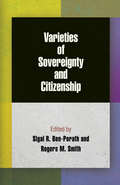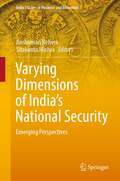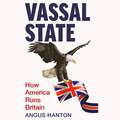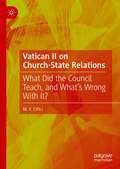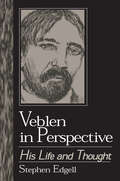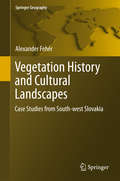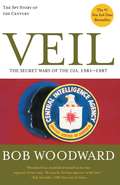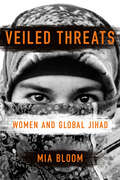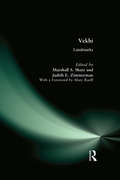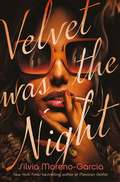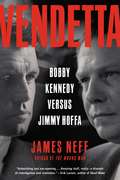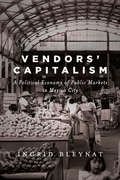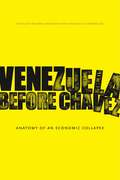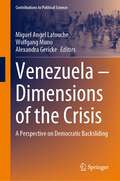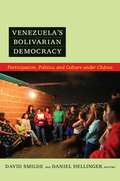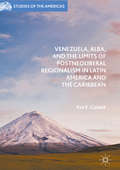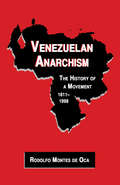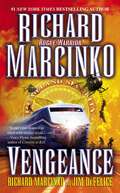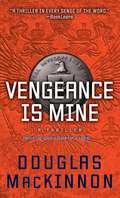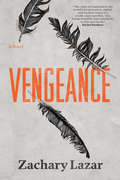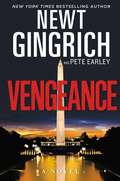- Table View
- List View
Varieties of Sovereignty and Citizenship
by Sigal R. Ben-Porath Rogers M. SmithIn Varieties of Sovereignty and Citizenship, scholars from a wide range of disciplines reflect on the transformation of the world away from the absolute sovereignty of independent nation-states and on the proliferation of varieties of plural citizenship. The emergence of possible new forms of allegiance and their effect on citizens and on political processes underlie the essays in this volume.The essays reflect widespread acceptance that we cannot grasp either the empirical realities or the important normative issues today by focusing only on sovereign states and their actions, interests, and aspirations. All the contributors accept that we need to take into account a great variety of globalizing forces, but they draw very different conclusions about those realities. For some, the challenges to the sovereignty of nation-states are on the whole to be regretted and resisted. These transformations are seen as endangering both state capacity and state willingness to promote stability and security internationally. Moreover, they worry that declining senses of national solidarity may lead to cutbacks in the social support systems many states provide to all those who reside legally within their national borders. Others view the system of sovereign nation-states as the aspiration of a particular historical epoch that always involved substantial problems and that is now appropriately giving way to new, more globally beneficial forms of political association. Some contributors to this volume display little sympathy for the claims on behalf of sovereign states, though they are just as wary of emerging forms of cosmopolitanism, which may perpetuate older practices of economic exploitation, displacement of indigenous communities, and military technologies of domination. Collectively, the contributors to this volume require us to rethink deeply entrenched assumptions about what varieties of sovereignty and citizenship are politically possible and desirable today, and they provide illuminating insights into the alternative directions we might choose to pursue.
Varying Dimensions of India’s National Security: Emerging Perspectives (India Studies in Business and Economics)
by Anshuman Behera Sitakanta MishraThis book engages a comprehensive approach to understand both traditional and non-traditional security issues in addressing dimensions of India’s national security. The issues highlighted in the book through fourteen distinct, yet inter-related, chapters offer insightful reading to India’s national security. This edited book explores the criticalities of various security issues in India, internal and external, and digs deep into the government responses to each of these issues. Stepping away from merely focusing on the state-centric understanding of national security, this book also includes human security perspectives. In this process, this book also offers set of policy recommendations which could be used for effectively dealing with the national security challenges. The themes covered in this edited book range from offering a conceptual framework of national security to issues such as energy security, maritime security, nuclear security, internal security, neighborhood policy, dumping, terrorism, economic security, cyber security, role of media, defense preparedness, and use of GIS in security domain. This book highlights some of the important security issues around the larger perspective of India’s national security. This book will be highly useful for the students and scholars of security and strategic studies and international relations and also to the policymakers in the region.
Vassal State: How America Runs Britain
by Angus HantonBritish politicians love to vaunt the benefits of the UK's supposed 'special relationship' with the US. But are we really America's economic partner - or its colony?Vassal State lays bare the extent to which US corporations own and control Britain's economy: how American business chiefs decide what we're paid, what we buy, and how we buy it. US companies have carved up Britain between them, siphoning off enormous profits, buying up our most lucrative firms and assets, and extracting huge rents from UK PLC - all while paying little or no tax. Meanwhile, policymakers, from Whitehall mandarins to NHS chiefs, shape their decisions to suit the whims of our American corporate overlords.Based on his 40 years of business experience, devastating new research, and interviews with the major players, Angus Hanton exposes why Britain has become the poor transatlantic relation - and what we can do to change it.
Vatican II on Church-State Relations: What Did the Council Teach, and What's Wrong With It?
by M. Y. CiftciShould religion and politics be kept apart? What should be the relationship between the church and the state? M.Y. Ciftci answers these questions by studying the most important event in the recent history of the Catholic Church: The Second Vatican Council (1962-65). The book provides a new interpretation of the Council’s teaching on church-state relations to better appreciate its flaws and need for reform. By paying attention to the (often overlooked) importance given by the Council to the lay apostolate, it reveals how the Council did not reform, as is often thought, but retained a flawed conception of the laity’s role in politics. It then proposes a new framework for understanding church-state relations using the ressourcement method of returning to scripture and tradition, and by a critical dialogue with Oliver O’Donovan and various Protestant biblical scholars of the Powers in the New Testament. Ciftci shows how fruitful an self-consciously ecumenical approach can be for political theology. As most ressourcement theologians have overlooked political issues, and since ecumenical theology rarely touches on issues of church-state relations, this work makes an original contribution to the ressourcement project and to ecumenism.
Veblen in Perspective: His Life and Thought (Studies In Institutional Economics)
by Stephen EdgellThis work discusses the impact and contemporary relevance of the work of Thorstein Veblen, as well as the source of his ideas. It suggests that he was one of the first modern sociologists of consumption whose analysis of contemporary display and fashion anticipated later theories and research.
Vegetation History and Cultural Landscapes: Case Studies from South-west Slovakia (Springer Geography)
by Alexander FehérThis book focuses on the vegetation history of the cultural landscape in southwestern Slovakia, which was established and adopted by mankind and has since constantly evolved in response to ongoing changes (in environmental conditions, biodiversity, land use, etc.). The book analyses four dominant ecosystems typical for the cultural landscape and affected by humans: woodlands, wetlands, grasslands and agricultural land. Each ecosystem is discussed in separate chapters. The chapters include (a) basic information, general aspects, development processes, trends and interpretations, (b) a published or non-published case study based on the author’s own research, and (c) an extensive bibliography. A set of maps on the vegetation history and indices of geographical names and plants names serve to round out the coverage. The work provides an essential point of departure for describing the typical regional characteristics of the cultural landscape, with an eye to its future preservation.
Veil: The Secret Wars of the CIA, 1981-1987
by Bob WoodwardVeil is the story of the covert wars that were waged in Central America, Iran and Libya in a secretive atmosphere and became the centerpieces and eventual time bombs of American foreign policy in the 1980s.
Veiled Threats: Women and Global Jihad
by Mia BloomVeiled Threats challenges the idea that women in violent terrorist groups lack agency. Too often, these women are assumed to be controlled by men: their fathers, their husbands, or some other male relative. Mia Bloom contests this narrow understanding. Although extremist groups often control different aspects of women's lives, including their religious obligations or dress, jihadi women have asserted themselves in myriad ways. Bloom interrogates the prevailing perceptions about women's involvement in violent extremism exclusively as victims: manipulated, drugged, or coerced. Following her pioneering work on women in Bombshell, Bloom lifts the veil of the secret world of women in jihadi groups to provide a nuanced and complex explanation of their motivations and challenge misperceptions about women's agency. Veiled Threats explores the range of roles of the women involved in jihad—not only across secular and religious groups but within affiliated religious groups—and examines how these extremist groups have used rape as a weapon of war. Bloom explains how women are used and abused, deployed and destroyed, and the many ways in which their roles in terrorism have evolved over the past three decades.
Vekhi: Landmarks
by Marshall S. Shatz Nikolei Berdiaev S.N. Bulgakov Frank Semen Judith E. ZimmermanA collection of essays first published in Moscow in 1909. Writing from various points of view, the authors reflect the diverse experiences of Russia's failed 1905 revolution. Condemned by Lenin and rediscoverd by dissidents, this translation has relevance for discussions on contemporary Russia.
Velvet Was the Night: the stunning new noir thriller by the bestselling author of Mexican Gothic
by Silvia Moreno-Garcia1970s Mexico City: while student protests and political unrest consume the city, Maite seeks escape from her humdrum life in the stories of passion and danger filling the latest issue of Secret Romance. She is deeply envious of her neighbour, a beautiful art student apparently living the life of excitement and intrigue Maite craves - so when Leonora disappears under suspicious circumstances, Maite finds herself searching for the missing woman, journeying deep into Leonora's secret life of student radicals and dissidents.'Cements Silvia Moreno-Garcia's incredible versatility as an amazing writer who moves between genres effortlessly. A lush, magnificent trip into a world of danger and discovery. Not to be missed!' S.A. COSBY, author of BLACKTOP WASTELANDBut someone else is also looking for Leonora, at the behest of his boss, a shadowy figure who commands goon squads dedicated to squashing political activists. Elvis is an eccentric criminal who longs to escape his own life: he loathes violence and loves old movies and rock 'n' roll. Watching Maite from a distance, he comes to see her as a kindred spirit who shares his love of music and the unspoken loneliness of his heart.As Maite and Elvis come closer to discovering the truth behind Leonora's disappearance, they can no longer escape the dangers threatening to consume their lives, with hitmen, government agents and Russian spies all aiming to find or protect Leonora's secrets - at gunpoint.Velvet Was the Night: an edgy, passionate, simmering noir thriller from a writer at the very top of her game.
Velvet was the Night
by Silvia Moreno-GarciaFrom the New York Times bestselling author of Mexican Gothic comes a riveting noir thriller about a daydreaming secretary and a lonely enforcer - and the missing woman they are both seeking.1970s Mexico City: while student protests and political unrest consume the city, Maite escapes from her humdrum life in the stories of passion and danger that fill the latest issue of Secret Romance.She is deeply envious of her neighbour, Leonora, a beautiful art student who lives the life of excitement and intrigue Maite craves - so when she disappears under suspicious circumstances, Maite jumps at the chance to uncover Leonora's secrets.Maite is not the only one searching for the missing girl. Elvis, a goon-for-hire who is longing to escape his violent life, has been assigned to find the student. Like Maite, he loves old movies, comics and rock 'n' roll . . . and he's beginning to be interested in the mousy secretary who is fast becoming involved in a world of political intrigue.As Maite and Elvis follow Leonora's trail, they journey deeper into a world of student radicals, hitmen, government agents and Russian spies, who are all determined to unearth Leonora's secrets- at gunpoint.Velvet was the Night is an explosive combination of such classic '70s thrillers as Three Days of the Condor and contemporary Mexican noir like Yuri Herrera's celebrated Signs Preceding the End of the World.(P) 2021 Penguin Audio
Vencer A Gripe
by Richard Stooker Ana FigueiredoOs especialistas concordam que uma grave pandemia de gripe é apenas uma questão de tempo.Mas existem muitas formas de se proteger a si e à sua família. Há muitas substâncias económicas que estão amplamente disponíveis. Todas as pessoas podem tomar medidas para se protegerem a si mesmas e às suas famílias.O pesadelo é uma outra gripe ao estilo da que ocorreu em 1918, que foi altamente contagiosa e letal. Uma gripe dessas poderia matar dezenas de milhares de pessoas por todo o mundo.A gripe sazonal mata entre 20 a 40 mil americanos por ano, e um número desconhecido de pessoas em outros países.O vírus da gripe suína já sofreu mutações para formas resistentes tanto à vacina como ao Tamiflu."Vencer a gripe" é um guia completo para o ajudar a reforçar o sistema imunitário de forma a prevenir e, se necessário, tratar a gripe."Vencer a gripe" explica os sete perímetros do sistema de defesa e os sete magníficos da imunidade.
Vendetta: Bobby Kennedy Versus Jimmy Hoffa
by James NeffOne of America's greatest investigative reporters brings to life the gripping, no-holds-barred clash of two American titans: Robert Kennedy and his nemesis Jimmy Hoffa.From 1957 to 1964, Robert Kennedy and Jimmy Hoffa channeled nearly all of their considerable powers into destroying each other. Kennedy's battle with Hoffa burst into the public consciousness with the 1957 Senate Rackets Committee hearings and intensified when his brother named him attorney general in 1961. RFK put together a "Get Hoffa" squad within the Justice Department, devoted to destroying one man. But Hoffa, with nearly unlimited Teamster funds, was not about to roll over. Drawing upon a treasure trove of previously secret and undisclosed documents, James Neff has crafted a brilliant, heart-pounding epic of crime and punishment, a saga of venom and relentlessness and two men willing to do anything to demolish each other.
Vendors' Capitalism: A Political Economy of Public Markets in Mexico City
by Ingrid BleynatMexico City's public markets were integral to the country's economic development, bolstering the expansion of capitalism from the mid-nineteenth to mid-twentieth centuries. These publicly owned and operated markets supplied households with everyday necessities and generated revenue for local authorities. At the same time, they were embedded in a wider network of economic and social relations that gave market vendors an influence far beyond the running of their stalls. As they fed the capital's population, these vendors fought to protect their own livelihoods, shaping the public sphere and broadening the scope of popular politics. Vendors' Capitalism argues for the centrality of Mexico City's public markets to the political economy of the city from the restoration of the Republic in 1867 to the heyday of the Mexican miracle and the PRI in the 1960s. Each day vendors interacted with customers, suppliers, government officials, and politicians, and the multiple conflicts that arose repeatedly tested the institutional capacity of the state. Through a close reading of the archives and an analysis of vendors' intersecting economic and political lives, Ingrid Bleynat explores the dynamics, as well as the limits, of capitalist development in Mexico.
Venezuela Before Chávez: Anatomy of an Economic Collapse
by Ricardo Hausmann Francisco R. RodríguezAt the beginning of the twentieth century, Venezuela had one of the poorest economies in Latin America, but by 1970 it had become the richest country in the region and one of the twenty richest countries in the world, ahead of countries such as Greece, Israel, and Spain. Between 1978 and 2001, however, Venezuela’s economy went sharply in reverse, with non-oil GDP declining by almost 19 percent and oil GDP by an astonishing 65 percent. What accounts for this drastic turnabout? The editors of Venezuela Before Chávez, who each played a policymaking role in the country’s economy during the past two decades, have brought together a group of economists and political scientists to examine systematically the impact of a wide range of factors affecting the economy’s collapse, from the cost of labor regulation and the development of financial markets to the weakening of democratic governance and the politics of decisions about industrial policy. Aside from the editors, the contributors are Omar Bello, Adriana Bermúdez, Matías Braun, Javier Corrales, Jonathan Di John, Rafael Di Tella, Javier Donna, Samuel Freije, Dan Levy, Robert MacCulloch, Osmel Manzano, Francisco Monaldi, María Antonia Moreno, Daniel Ortega, Michael Penfold, José Pineda, Lant Pritchett, Cameron A. Shelton, and Dean Yang.
Venezuela Before Chávez: Anatomy of an Economic Collapse
by Ricardo Hausmann Francisco RodrÍguezAt the beginning of the twentieth century, Venezuela had one of the poorest economies in Latin America, but by 1970 it had become the richest country in the region and one of the twenty richest countries in the world, ahead of countries such as Greece, Israel, and Spain. Between 1978 and 2001, however, Venezuela’s economy went sharply in reverse, with non-oil GDP declining by almost 19 percent and oil GDP by an astonishing 65 percent. What accounts for this drastic turnabout? The editors of Venezuela Before Chávez, who each played a policymaking role in the country’s economy during the past two decades, have brought together a group of economists and political scientists to examine systematically the impact of a wide range of factors affecting the economy’s collapse, from the cost of labor regulation and the development of financial markets to the weakening of democratic governance and the politics of decisions about industrial policy. Aside from the editors, the contributors are Omar Bello, Adriana Bermúdez, Matías Braun, Javier Corrales, Jonathan Di John, Rafael Di Tella, Javier Donna, Samuel Freije, Dan Levy, Robert MacCulloch, Osmel Manzano, Francisco Monaldi, María Antonia Moreno, Daniel Ortega, Michael Penfold, José Pineda, Lant Pritchett, Cameron A. Shelton, and Dean Yang.
Venezuela – Dimensions of the Crisis: A Perspective on Democratic Backsliding (Contributions to Political Science)
by Wolfgang Muno Miguel Angel Latouche Alexandra GerickeThe book is devoted to the subject of Venezuela's politics and the different dimensions of its longstanding crisis, with various researchers exchanging ideas on the current problems affecting the country. It is the first comprehensive overview on the dimensions of Venezuela’s current crisis written in English, thus filling an important research gap. Especially the participation of international, well-known scholars make it a global enterprise. The book covers historical and theoretical facts surrounding the case of Venezuela and also focuses on the parties and actors that play decisive roles in the conflict. Subjects include the military, public administration, ideology, the opposition, the party landscape along with its crisis and Venezuela's oil policy. Furthermore the book touches upon international and regional aspects: Venezuela's diplomatic relations with the EU, the USA, Cuba and Colombia, respectively. The volume addresses a wider audience, such as scholars on Latin American and especially Venezuelan Politics, International Relations, as well as an interested public, including journalists and politicians.
Venezuela's Bolivarian Democracy: Participation, Politics, and Culture Under Chávez
by David Smilde Daniel HellingerVenezuela's Bolivarian Democracy brings together a variety of perspectives on participation and democracy in Venezuela. An interdisciplinary group of contributors focuses on the everyday lives of Venezuelans, examining the forms of participation that have emerged in communal councils, cultural activities, blogs, community media, and several other forums. The essays validate many of the critiques of democracy under Chvez, as well as much of the praise. They show that while government corporatism and clientelism are constant threats, the forms of political and cultural participation discussed are creating new discourses, networks, and organizational spaces--for better and for worse. With open yet critical minds, the contributors seek to analyze Venezuela's Bolivarian democratic experience through empirical research. In doing so, they reveal a nuanced process, a richer and more complex one than is conveyed in international journalism and scholarship exclusively focused on the words and actions of Hugo Chvez. Contributors Carolina Acosta-Alzuru Julia Buxton Luis Duno Gottberg Sujatha Fernandes Mara Pilar Garca-Guadilla Kirk A. Hawkins Daniel Hellinger Michael E. Johnson Luis E. Lander Margarita Lpez-Maya Elizabeth Gackstetter Nichols Coraly Pagan Guillermo Rosas Naomi Schiller David Smilde Alejandro Velasco
Venezuela, ALBA, and the Limits of Postneoliberal Regionalism in Latin America and the Caribbean
by Asa K. CusackThis book provides a comprehensive analysis of the implementation, functioning, and impact of the Bolivarian Alliance for the Peoples of Our America (ALBA), cornerstone of Venezuelan foreign policy and standard-bearer of “postneoliberal” regionalism during the “Left Turn” in Latin America and the Caribbean (1998-2016). It reveals that cooperation via ALBA’s regionalised social missions, state multinationals, development bank, People’s Trade Agreement, SUCRE virtual currency, and Petrocaribe soft-loan scheme has often been hampered by complexity and conflict between the national political economies of Ecuador, Dominica, St Vincent and the Grenadines, Antigua and Barbuda, and especially Venezuela. Shared commitments to endogenous development, autonomy within mutlipolarity, and novel sources of legitimacy are undermined by serious deficiencies in control and accountability, which stem largely from the defining influence of Venezuela’s dysfunctional economy and governance. This dual dependency on Venezuela leaves the future of ALBA hanging in the balance.
Venezuelan Anarchism: The History of a Movement (Anarchism: The History of a Movement)
by Rodolfo Montes de OcaVenezuelan Anarchism: The History of a Movement covers Venezuelan anarchism and its partisans from the first appearance of anarchist ideas in the period prior to independence through today. Venezuelan political histories have focused almost exclusively upon the various Venezuelan governments and political parties. Venezuelan Anarchism shifts the focus to those opposed to those governments and political parties, those who until now have been nearly forgotten. The book also explains in some detail their ideas, publications, and actions in opposition to Venezuela's ruling political elites and, more recently, Venezuela's authoritarian populists.
Venezuela’s Movimiento al Socialismo
by Steve EllnerTeodoro Petkoff and the other members of the Movimiento al Socialismo (MAS) in Venezuela had aroused the ire of the orthodox communist leaders by claiming to be both authentic communists and true nationalists, not bound by the dictates of either the Moscow or Maoist/Beijing wings of the party. To infuriate the traditionalists even further, Petkoff and his associates succeeded in being more than isolated critics, as MAS quickly eclipsed the traditional Venezuelan Communist Party and became that country's leading leftist group.The author places MAS in its international national, and historical contexts in order to determine the extent to which it is a unique communist party, as it claims to be. He traces the theory of "national democratic revolution, " which MAS rejects, back to Lenin, and discusses the Latin American left's reevaluation of that thesis. Ellner examines the guerrilla movement in Venezuela, the student movement of the late 1960s, and the emergence of the "New Left" in other countries, especially noting their influence on the formation of MAS. He also discusses the group's role in Venezuelan elections and it's relations with the other parties.
Vengeance (Rogue Warrior #12)
by Richard MarcinkoFormer SEAL Team Six leader and American hero Richard Marcinko is back in action with a thriller ripped from tomorrow's headlines. Mixing fact with fiction, Marcinko returns to his authentic, no-holds-barred style in the latest explosive installment of his New York Times bestselling series, Rogue WarriorR®: Vengeance. Armed with irreverent wit and a fully loaded submachine gun, Marcinko's fictional alter ego takes no prisoners as he and his Red Cell II team tackle fat-cat American bureaucrats as well as terrorists. Interspersing action with his classic combination of wisecracks and earthy humor, Marcinko crams a chemical explosion, a high-speed helicopter chase, a train hijacking, and a headless corpse into the first few pages. When it becomes clear that terrorists are gunning for Demo Dick as well as the country's most precious symbols and institutions, things become very personal. Forget the Rogue Warrior's usual terms of endearment -- this time he's out for blood. Launched on an all-out international hunt, Demo Dick discovers a plot targeting the country's largest shipping port for liquefied petroleum gas...but that's just a prelude for Independence Day. Of all the thriller writers out there today, only one has truly walked the walk and talked the talk. Marcinko infuses his new book with stories and details that could come only from the inside -- which makes them all the more alarming. Reserve the edge of your seat for this one....
Vengeance Is Mine
by Douglas MackinnonHELL IS TOO GOOD A PLACE FOR A SADIST. . . . Twenty years after ex-CIA special ops agent Ian Wallace watched a KGB colonel brutally murder the love of his life and their unborn child, he's still wishing the monster Vladimir Ivanchenko had killed him off, too. Endlessly haunted by nightmarish memories of torture, Wallace, the fanatically conservative private investigator, can't seem to escape the bowels of Moscow's Lubyanka prison, even while reaping the comforts of life in suburban Boston. But when the devil himself comes to Beantown on another twisted mission, who better to hunt down Ivanchenko--the Russian mafia don now deemed the most dangerous man in the world--than the fueled-by-guilt and hungry-for-revenge Wallace? All he must do to earn the forty grand the CIA offers him for the task is dedicate the next two weeks of his life to guarding Ivanchenko's target--an obnoxious, greedy, and big government-loving MIT professor, whose research on Ballistic Missile Defense is a matter of national security. That, and partner up with the irresistibly sexy and tough-as-nails Kathy Donahue. Straight from the bleak deserts of war-torn Afghanistan, she just might be the secret to opening up Wallace's sealed and scarred heart. Tension between the highly experienced agents builds, but Wallace's bloodthirsty desire for Ivanchenko's demise reveals his own evil nature, scaring Donahue away. And, as friends and enemies sacrifice their lives to harbor and reveal secrets, Wallace doesn't know to what maniacal extreme he will go to bury his own.
Vengeance: A Novel
by Zachary Lazar“Tense and evocative . . . . Despite its powerful social critique, Vengeance is cautious and prismatic, openly troubled by its own claims to authority.” —Katy Waldman, The New YorkerAs the narrator attempts to sort out what happened in King’s life—paying visits to his devoted mother, his estranged young daughter and her mother, his girlfriend, his brother, and his cousin—the writer’s own sense of identity begins to feel more and more like a fiction. He is one of the “free people” while Kendrick, who studies theology and philosophy, will never get his only wish, expressed plainly as “I just need to get out of here.” The dichotomy between their lives forces the narrator to confront the violence in his own past, and also to reexamine American notions of guilt and penance, racial bias, and the inherent perversity of punitive justice.It is common knowledge that we have an incarceration crisis in our country. Vengeance, by way of vivid storytelling, helps us to understand the failure of empathy and imagination that causes it.
Vengeance: A Novel (The Major Brooke Grant Series #3)
by Newt Gingrich Pete Earleyp.p1 {margin: 0.0px 0.0px 0.0px 0.0px; font: 11.0px Helvetica; color: #232323} p.p2 {margin: 0.0px 0.0px 0.0px 0.0px; font: 11.0px Helvetica} span.s1 {font-kerning: none} p.p1 {margin: 0.0px 0.0px 0.0px 0.0px; font: 11.0px Helvetica; color: #232323} p.p2 {margin: 0.0px 0.0px 0.0px 0.0px; font: 11.0px Helvetica} span.s1 {font-kerning: none} p.p1 {margin: 5.0px 0.0px 5.0px 0.0px; font: 12.0px Geneva; color: #424242} p.p1 {margin: 0.0px 0.0px 0.0px 0.0px; font: 11.0px Helvetica; color: #232323} p.p2 {margin: 0.0px 0.0px 0.0px 0.0px; font: 11.0px Helvetica} span.s1 {font-kerning: none} Leading politician and bestselling author Newt Gingrich and novelist Pete Earley are back with another gripping international thriller. p.p1 {margin: 5.0px 0.0px 5.0px 0.0px; font: 12.0px Geneva; color: #424242} A terrorist drives an explosive-packed rental truck into Major Brooke Grant's Washington, D.C., wedding, intending to detonate a deadly bomb. Saved by a last-minute fluke, Brooke seeks revenge against the master terrorist responsible, an international radical Islamist known only as the Falcon, who is determined to murder her, bring America to its knees, and create a modern-day caliphate. An unorthodox, newly sworn-in president recruits Brooke to join a clandestine CIA team in pursuit of the Falcon. With help from an odd coupling-a Saudi intelligence officer and an Israeli Mossad agent-Brooke goes after her elusive zealot nemesis. But before the trio can close in on their target, they discover that America's worst nightmare has come true. Intertwined with backroom Washington political intrigue, Vengeance is a fast-paced, realistic thriller that entertains while raising serious questions about our national security, the power of religious faith to inspire good and evil, the consequences of revenge, and the validity of our constitutional safeguards. Former Speaker of the House Newt Gingrich and Washington Post reporter turned novelist Pete Earley are at their best in this third installment of their bestselling Brooke Grant series.
